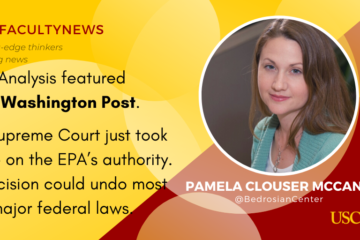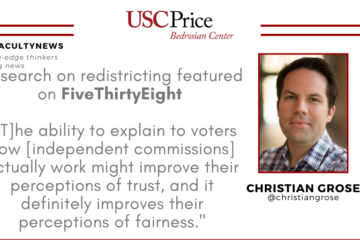Study analyzing public transit stigma on Twitter wins best article in JAPA
USC Price School of Public Policy Associate Professor Lisa Schweitzer’s article titled “Planning and Social Media: A Case Study of Public Transit and Stigma on Twitter,” published in the Journal of the American Planning Association, has been selected by the journal’s associate editors as the best paper in 2014.
The award will be presented in April at the American Planning Association’s Annual Conference in Seattle.
Schweitzer discussed the findings from her study at a recent USC Price research seminar. Public transit agencies using Twitter to chat with users about their experiences receive significantly more positive comments on social media, she told the audience.
There are six decades of experimental research on media effects showing that there is a clear media influence on what people think about, when they think about it and sometimes how they think about it. However, there isn’t nearly as much research on social media effects because of its recent emergence.
Four years ago, Schweitzer set out to analyze social media data as they pertain to public transit. Social media has a lot of strategic opportunities for public agencies, but few were using it effectively for marketing or public relations.
“It became clear to me that this was changing communication in ways we probably want to think about,” Schweitzer said. “But it isn’t easy to gather social media data, and it’s not really clear what you have when you have it.”
Schweitzer sampled 64,000 tweets over four years, searching for negative terms and positive terms referencing not only 10 transit agencies but also 10 airlines, parks, social welfare programs and police departments in order to make a comparison.
Her main findings were that transit stigma is measurable and significant on social media by casual race, class and gender slurs, and that transit agencies which interact with people have a more positive response to their shared information than agencies that blast out announcements.
Transit that rated lowest in sentiment scores, such as the Chicago Transit Authority, were the ones essentially tweeting out their problems to the world with notices of delays and changes in service. When a customer service representative was available to respond to tweeted complaints from riders, people tended to be less overtly offensive. Having a dialogue with users also made it more likely that they would retweet something like a bike-share survey offered by the agency.
“I suggest agencies use Twitter for customer service complaints that can be addressed at that moment,” Schweitzer said. “I don’t know what the cost-benefit is, but responding to queries about why service is late and questions about planning is good for the agency’s image.”
Schweitzer noted that Los Angeles Metro, which ranked only slightly negative, was fairly good at responding to tweets.
She also noticed that the Southeastern Pennsylvania Transportation Authority’s sentiment scores plunged when it ceased online customer service on Twitter for a period of time, but then the scores spiked again when it committed to having a dedicated social media representative.
Another interesting finding was that public transit receives more complaints about other patrons than airlines do; however, if those criticisms are removed, people complain about airlines and transit the same amount. This stands in contrast to common assumptions that airlines would be better managed for being privatized.
“The mining of social media for how people react and think about things is going to be a coming trend,” said Stephen Hubbard, a doctoral student at USC Price, who attended the seminar. “Dr. Schweitzer did a fascinating job of viewing people’s reactions and figuring out how you analyze that and try to make something meaningful out of it.”
The event was sponsored by the METRANS Transportation Center in partnership with the International Public Policy and Management (IPPAM) graduate student organization.



